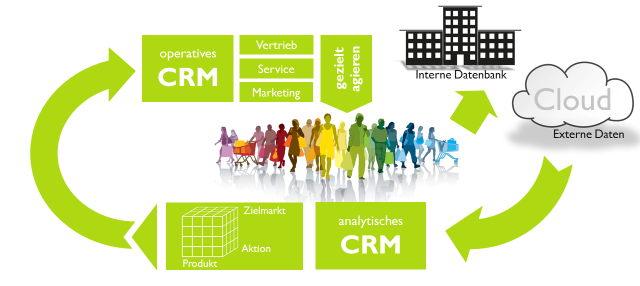 Today, in a modern company, technological support is essential for managing all business processes. Therefore, in addition to an efficient ERP system, many companies also deploy a CRM system. After all, through intelligent combination of the data from the two business applications, the constantly changing buying behaviour of the modern and complex market environment can be reacted to in a structured manner within the framework of an analytical CRM concept.
Today, in a modern company, technological support is essential for managing all business processes. Therefore, in addition to an efficient ERP system, many companies also deploy a CRM system. After all, through intelligent combination of the data from the two business applications, the constantly changing buying behaviour of the modern and complex market environment can be reacted to in a structured manner within the framework of an analytical CRM concept.
Whether in the creation of marketing campaigns, the generation of leads, the management of sales opportunities or the optimised service of existing customers, an operational CRM system supports companies in all industries in automating various tasks in the fields of marketing, sales and service. In this way the platform makes it possible to influence customers and the market. Thus it offers the ideal basis for optimised customer orientation and making well-founded decisions.
With this, the uses of a CRM system are far from exhausted yet. Combined with other data sources and a suitable business intelligence solution, the software can also be used to pursue the approach of analytical CRM. The combination of the various databases and the exchange of information between them facilitate the systematic processing and evaluation of the data collected in the operational systems and make it possible to link the data. The mentioned information can be, for example, customer reactions, sales figures, transactions or other data from various areas of application of the ERP and CRM systems.
However, it is not always possible to obtain all relevant market data (e.g. interested-party behaviour and customer satisfaction) directly from one’s own ERP or CRM system. In line with the fast-growing quantity of big data, some information is only available externally, i.e. in the cloud. Ultimately, the goal is to filter out the data that is important for the respective company from this cloud and to include it in analyses and evaluations.
So using the idea of analytical CRM, customer behaviour patterns, company potential or current market conditions analysed and evaluated by the BI tool from various internal and external data sources, for example, can serve as an ideal decision-making base for future actions. For even better processing of the analyses and evaluations, integrating these directly into the surface of the other operational systems respectively is a good option. In this case the connected CRM can ensure the optimisation and control of further operational CRM processes and impact on the future strategic alignment of the company.
Thus, in a concrete case of application, the buying behaviour of customers could be assessed, for example, on the basis of various internal and external data via the BI software. By means of the analysis, it can ultimately be recognised which customers (e.g. categorised according to age or region) purchased which products in the recent past and how satisfied they were with their purchase. Then, in a subsequent mailing campaign, specific target groups can be written to in operational CRM and encouraged to purchase relevant products again. Customer groups who have not bought anything for a long time or were dissatisfied with their purchases can be left out or receive other offers. In this way, CRM can be used in a targeted manner for efficient communication, for detecting and harnessing trends and consequently for optimising customer satisfaction and sales measures.
Using the NAVdiscovery Toolbox developed by prisma informatik, the integration of the individual systems required for this can be implemented quickly and cost-effectively. The connector links the business intelligence solutions QlikView and Qlik Sense with Microsoft Dynamics NAV, CRM and as many other data sources as desired (e.g. Qlik DataMarket).

